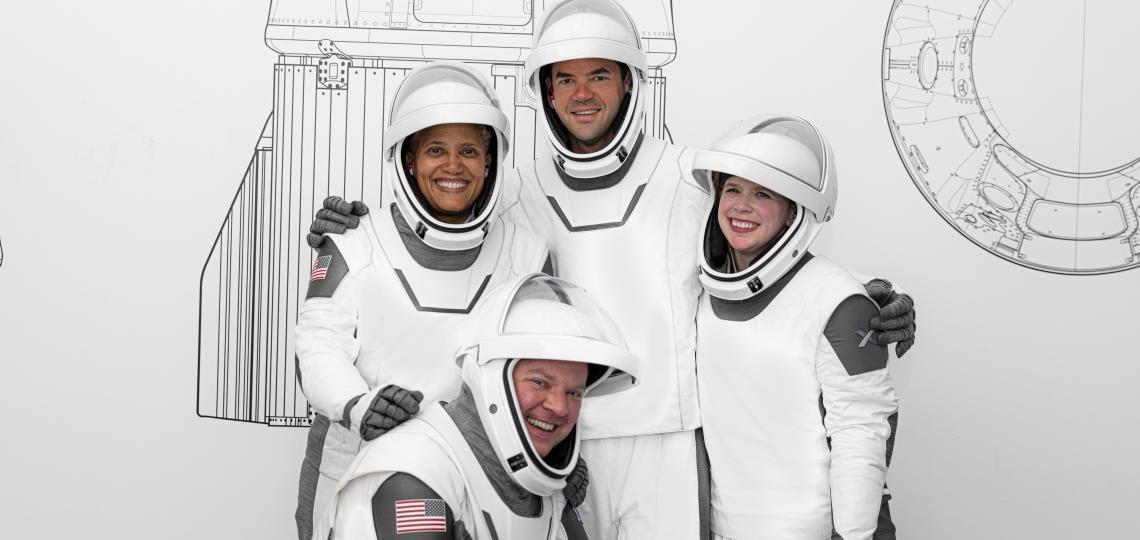TRISH Research Launches into Space Aboard Historic Inspiration4 Mission
A suite of important human health research projects launched to space on Sept. 15, 2021, as part of the Inspiration4 mission. The mission is the world’s first all-civilian commercial crew to orbit the Earth. The Translational Research Institute for Space Health (TRISH) partnered with the Inspiration4 crew and SpaceX to enable health science and technology research before, during and after the flight that benefits our collective understanding of the human body.
TRISH is a virtual institute working in partnership with the NASA Human Research Program. The Institute supports health and human performance research and technology that can enable every human to explore space.
Projects
Re-adaptation to gravity after spaceflight: sensorimotor testing
Principal Investigator: Mark J. Shelhamer, Sc.D., Johns Hopkins University School of Medicine
Co-Investigator: Michael Schubert, Johns Hopkins University School of Medicine
In Zero G, astronauts lose their sense of up and down. This neurovestibular concern could cause motion sickness, nausea, and other disorienting effects. Dr. Shelhamer, of Johns Hopkins, will study how passengers’ inner ears sense up and down on Earth (and how this is changed in space), and how they use that information to control eye position and posture. The results might enable prediction of who will get motion sickness in spaceflight. The tests are easy to administer via a tablet computer. If effective, they could help prevent or minimize the effects of motion sickness and disorientation, improving the spaceflight experience.
Miniaturized medical imaging for space: Butterfly iQ+ ultrasound
Investigator: Ashot Sargsyan, M.D., KBR
Co-Investigator: Douglas Ebert, Ph.D., KBR; Kadambari Suri, KBR
During spaceflight, bodily fluids move differently inside of the human body, and crew are more susceptible to certain medical conditions. Medical imaging can be deployed to monitor and track these changes. Ultrasound is NASA’s preferred medical imaging modality for tracking the health of astronauts on the International Space Station (ISS), as well as for future deep space exploration missions to Mars. Crew on the Inspiration4 will use a hand-held, portable Butterfly iQ+ ultrasound device to study differences in structure and fluid movement in neck veins, eye, gallbladder, and urinary bladder compared to on Earth. In addition, this study is evaluating how effective the Butterfly iQ+’s simple interface and AI technology enable minimally-trained passengers to acquire high-quality ultrasound images, which are normally collected by ultrasound technicians. If validated, this could become an important diagnostic tool for medical systems on future deep space missions.
Neurocognitive performance
Investigator: Mathias Basner, MD, Ph.D., MSC, University of Pennsylvania Perelman School of Medicine
Co-Investigator: Alexander Stahn, University of Pennsylvania
Going into space is a stressful experience- not just for the human body, but also the mind. Increased stress can affect crew behavior and performance. Dr. Basner and his team at the University of Pennsylvania have developed a cognitive test battery for astronauts they will use to assess I4 crew performance on a broad range of cognitive domains. Researchers will correlate cognitive test results with health vitals collected from an Apple Watch and environmental data collected from Dragon. NASA astronauts undergo rigorous training to prepare for the stressful mission. Cognitive and physiologic data collected in the I4 crew will improve understanding of how the general population will behave and perform in space travel, which becomes more relevant as more spaceflight passengers explore our solar system.
Miniaturized inflight blood/saliva analysis
Investigator: Fredric Zenhausern, Ph.D., MBA, University of Arizona
Co-Investigator: Jerome Lacombe, University of Arizona; Jian Gu, University of Arizona
Spaceflight exposes the crew to a unique environment of zero gravity and radiation. The body will respond with changes that can be detected through blood or saliva biomarkers that could be tracked with inflight sampling and analysis. Dr. Zenhausern at the University of Arizona has developed a vertical flow immunoassay (VFI) platform, which allows for real-time blood/saliva analysis. The platform uses a small finger prick of blood to self-diagnose specific biomarkers. If validated by the Inspiration4 crew, the VFI platform could give future space crew an easy-to-use blood and saliva analysis to support human health and performance. Furthermore, in collaboration with the Space X team, saliva samples and dried blood spots will be collected for the development of a biobank.
Data integration and future use
Investigator: Eric Bershad, M.D., Baylor College of Medicine
Co-Investigator: Mohammad Hirzallah, M.D.; Rahul Damani, M.D., M.P.H.; Chethan Venkatasubba Rao, M.D., Baylor College of Medicine
A key component of the research projects is the archiving and sharing of biomedical results, biobanking, and research data. TRISH is developing a commercial spaceflight research repository program titled Multimodal Evaluation of Spaceflight Health (MESH). This program will enable the seamless intake, archiving, standardization and sharing of research and biomedical data including biobanking of samples from commercial spaceflight participants with the end goal of increasing the body of evidence, increasing safety and enhancing human health and performance during spaceflight including personalization and prediction of countermeasures.
About the Inspiration4 mission
Inspiration4 is the world’s first all-civilian mission to orbit Earth. Inspiration4 was named in recognition of the four-person crew that will raise awareness and funds for St. Jude Children’s Research Hospital. Inspiration4 will leave Earth from NASA’s Kennedy Space Center historic Launchpad 39A, the same launch site for Apollo and Space Shuttle missions. Inspiration4 will then travel across low Earth orbit on a multiday journey, before returning to Earth. Inspiration4 commander and benefactor Jared Isaacman will be joined by Hayley Arceneaux, a St. Jude physician assistant and former St. Jude patient, Chris Sembroski, who served in the U.S. Air Force and now works in the aerospace industry, and Dr. Sian Proctor, an analog astronaut and geoscientist.








 Credit
Credit
